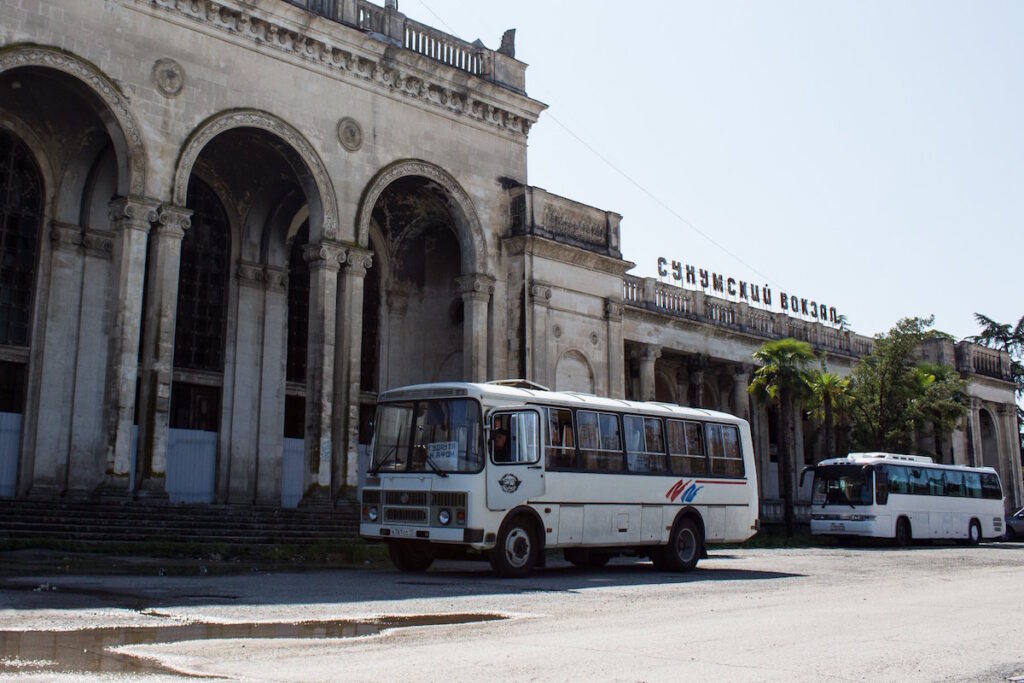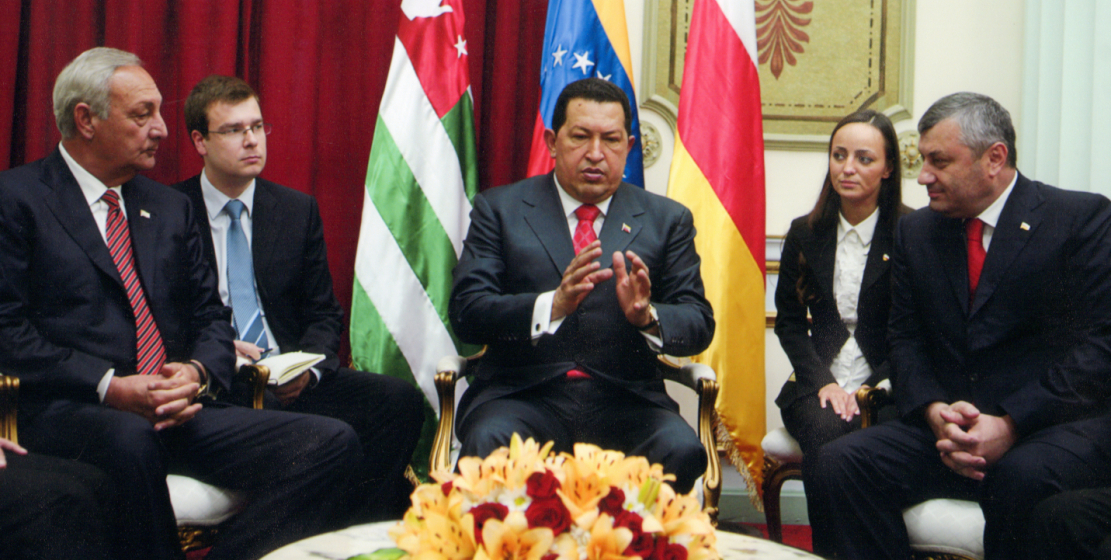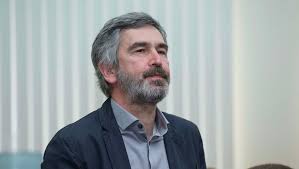Georgian-Abkhaz perspectives
Brief Summary
The article analyzes the options for resolving the Georgian-Abkhaz conflict in conditions of a new reality – the war between Russia and Ukraine. It is emphasized that it is unlikely against the backdrop of enormous military costs, that Russia will be able to continue to play the role
“patron-benefactor”, and this moment should be utilized.
Opinions are provided by political scientists: from the optimistic one (the new reality makes it possible to more actively demand a conclusion armed forces of the Russian Federation from conflict regions and their replacement by international peacekeeping forces), to skeptical (Russia will always have enough forces to recoup Georgia for the defeat in Ukraine and the West will not go to the division of the Russian Federation due to the presence of nuclear potential).
Various versions of the Georgian-Abkhazian settlement were analyzed: for example, risks and possible advantages in the case of signing a bilateral agreement on the non-use of force. Already accomplished facts of the official providing security guarantees to Abkhaz.
The article also analyzes the solution to those pressing problems that are already possible now: the legal status of the inhabitants of Gali, the free movement of Georgian citizens in Gali region and Abkhaz citizens to other countries, assessment of the military conflict in the years of 1992-93, the resumption of railway communication through Abkhazia, symbolic gestures and etc.
The importance of understanding the past – recent and historical – is emphasized. The vast majority of both Georgians and Abkhaz have no idea about the rich shared historical experience of our peoples in the first millennium of the new era.
Introduction
Three decades after the military conflict in Abkhazia, the Russian Federation has been the main determining factor in this region, playing the role of a security guarantor, sponsor, and political lobby. The war turned Russia into a political pariah, and the protracted hostilities hit its military and financial capabilities hard. Questions arise: to what extent can the “patron-benefactor” continue to perform its functions, which make it such a valuable strategic ally for Abkhazia? What opportunities does the new reality open up for Georgia? Will the weakening of the Russian factor help turn the Abkhazians towards the Georgians? What problems in Georgian-Abkhazian relations need to be solved first, and what problems can wait until better times? How to convince the Abkhazians that there is no danger of revanchism in Georgia?
The war in Ukraine caused a cardinal turn in world geopolitics. All this cannot but be reflected in the Transcaucasus, giving rise to new prospects and new risks. The positions of the Russian Federation in this region have been weakened, but this does not mean that it will not try to retain influence. The question arises: how can you use the situation, while avoiding possible risks?
According to political scientist Paata Zakareishvili (former Minister of State for Reintegration), the new reality makes it possible to demand the withdrawal of the Russian armed forces from the conflict regions and their replacement by international peacekeeping forces. This will help convince the population of Abkhazia that they are completely safe:
– Now our international task is to emphasize: Russia is obliged to withdraw its troops from Georgia, because it is the same aggressor here as in Ukraine. This needs to be documented. Let’s say everything works out and the Russians leave. What guarantees remain for Abkhazians and Ossetians? The EU monitoring mission has long been engaged in peacekeeping issues, which can be expanded both in personnel and financial terms. Georgia should develop a concept of reconciliation that could form the basis of the work of the international peacekeeping forces.
Kakha Gogolashvili (Senior Analyst at the Rondeli Foundation) believes that the presence of neutral peacekeeping forces may also help the Abkhaz side agree to the return of refugees:
— You can always find a solution that helps defuse tension. Under the influence of Russian propaganda, the Abkhazians think that if, God forbid, the Georgians return, they will definitely seek revenge. So the presence of neutral peacekeeping forces is mandatory. This will also create conditions for attracting the necessary investments for peacekeeping projects. For example, to restore destroyed houses in which refugees used to live, to pay compensation and much more. Funds, of course, will be allocated by the budget of Georgia.
Political scientist Malkhaz Saldadze’s forecasts are less optimistic. In his opinion, the new reality carries more risks than opportunities:
— Russia will most likely lose. But Russia always has enough strength to create problems for Georgia. Recently, information was circulated about a new union agreement with the participation of the Russian Federation, Belarus, Abkhazia, and the so-called YuO[1] . It is quite possible to present the Russians as a success. On the other hand, the conflict can also freeze at some stage. Abkhazians and Ossetians talk about the creation of a joint state, the return of refugees, etc. I doubt they will change position. Their elites are too dependent on Russia. Even a defeat in Ukraine is unlikely to affect this. When the USSR collapsed, the Russian Federation was left with only a small piece of the coast with Novorossiysk. The Russians have done everything to expand it as much as possible and will not want to lose influence on the Black Sea perimeter.
By the way: In 2021-2023, in the draft federal budget of the Russian Federation, 3.6 billion rubles were provided for raising salaries for state employees in Abkhazia and South Ossetia.
This means that despite huge financial losses during the war, the Russian Federation is still trying to bolster its influence. Consequently, it has no intention of leaving Transcaucasia at all.
The only thing that will give Georgia a chance to radically reverse the situation is the complete defeat of the Russian Federation, and this depends entirely on the international community. Malkhaz Saldadze:
– The West is unlikely to agree to the collapse of the Russian Federation because of its nuclear arsenal. Once upon a time, the collapse of the USSR came as a surprise to them – they thought it would happen thirty or forty years later. And then a new nuclear player immediately appeared – Ukraine. The latter was given guarantees that by abandoning its arsenal, it would maintain territorial integrity. The fact that this was not done is a topic for another discussion. Now there could be many more nuclear players. The point is not even the fact of possession of nuclear weapons, but the ability to control them. And here there are many risks.
A 180-degree turn by the Abkhazians is an elusive goal, but even for a small turn, the Abkhazians demand a guarantee of security – the signing of a bilateral agreement on the non-use of force. The Georgian side objects under the pretext that this is possible only between states and would mean the actual recognition of the independence of Abkhazia. Here is what Paata Zakareishvili says about this:
— Such agreements are possible not only between countries. Shevardnadze signed various texts with Ardzinba and Chibirov several times. Zhvania signed a ceasefire memorandum with Kokoity. They signed not as prime minister and president, but as representatives of the conflicting parties. This is international practice. Here Cyprus signs agreements with the unrecognized Northern Cyprus, and Kosovo with Serbia. There is no problem, even now, in the status of parties to the conflict, to sign an agreement on the non-use of force with the Abkhazians and Ossetians.
Facts: On November 27, 2010, President Saakashvili in Strasbourg before the European Parliament, on behalf of Georgia, assumed the duty of non-use of force. Later, the Georgian government sent an official letter to Strasbourg reaffirming the same commitments. “Georgian Dream” in the parliamentary resolution on March 7, 2013 “On the main directions of foreign policy” confirmed the strategy of non-use of military force.
And one more thing: by signing the association agreement with the EU, Georgia has assumed a formal obligation to each of its members not to carry out military operations in conflict regions.
What conclusions follow from this? The Georgian side long ago provided security guarantees – unilaterally. The demand of the Abkhaz to sign a bilateral agreement is nothing more than a matter of principle. However, if the signing of such a document really does not carry real risks, then our refusal is exactly the same infantile principle. Why, in this case, not go towards the Abkhaz? And knock out another trump card from the hands of pro-Russian opponents.
Well-conducted surveys are the surest source of identifying pain points. In the summer of 2012, public opinion surveys were conducted on steps that could contribute to the transformation of the conflict. The idea to conduct such studies was born as a result of a process of dialogue between the parties to the conflict, with the assistance of Conciliation Resources. Political and public figures, representatives of the authorities and the opposition, experts, journalists, civil society activists, NGO representatives, the unemployed, displaced persons, as well as young people from both the Georgian and Abkhaz sides took part.
The study is very interesting and multifaceted. It would be nice to repeat it in the conditions of a changed reality. The most important participants were recognized: the issue of recognition of the independence of Abkhazia and the signing of a bilateral agreement on the non-use of force; the legal status of the inhabitants of Gali, the free movement of Georgian citizens to the Gali region and Abkhaz citizens to other countries, an assessment of the military conflict of 1992-93, the resumption of railway communication through Abkhazia, symbolic gestures, etc.
According to Zakareishvili, it is time to seriously consider which of the above can be decided in the future and which right now:
– Georgia is not ready to recognize the independence of Abkhazia. The Abkhaz side is also not ready to recognize the territorial integrity of Georgia. Reasonable people, of whom there are many on both sides, will say: the final goals should be put aside so we can talk about problems that can be solved now. For example, about free trade, movement, education, cultural ties, and human rights. Abkhazians and Ossetians already move with their “passports” within Georgia, even receive services. You can temporarily recognize these “passports” for moving around the world, or, for starters, to neighboring states. For an official in Europe, it is important not what is written on the cover of the document, but who is responsible for this document and for this person. If we make it official that we take responsibility, then the mixing problems won’t be so insurmountable. Such temporary solutions can make life easier for people.
The question of financing is very important. Since 2009, the budget of Abkhazia has been dependent on the Russian budget by more than 50%. In 2009-2016, itreceived 36.86 billion rubles. https://www.bbc.com/russian/features-40862115 In 2019 – one billion rubles (for salaries and pensions), and in 2020 5.5 billion rubles. Time is working against the Russian Federation, which will find it increasingly difficult to make transfers sufficient to retain influence . According to economics expert Professor Ioseb Archvadze, Russia has always tried to keep the region under its supervision at minimal cost:
“Even by the indicators of 2020, the amount paid by the population of Georgia only for the excise tax on the sale of tobacco exceeds the amount of assistance allocated by the Kremlin to Abkhazia. We must offer the Abkhaz something that will be more attractive for them than staying with Russia. For example, in parallel with the proposal for the return of refugees and the reintegration of Abkhazia, it is possible to propose the formation of the budget of Abkhazia at a ratio of two to one. That is, its share in the budget of Georgia will be equal to twice the share of the population of Abkhazia in Georgia. It is also possible to allow the circulation of the Abkhaz lari within Abkhazia.”
The former Deputy General Staff of the Armed Forces, retired colonel Lasha Beridze, believes that the reason for all our failures is the lack of real power – political, informational, diplomatic, economic and military:
– In order to talk with Russians and Abkhazians from a winning position, integration with Europe and the comprehensive development of the country – economic and cultural – are important. As well as diplomatic maturity. We must also have a strong, well-trained army, modern weapons and qualified military specialists. By no means for an offensive war, but to demonstrate that our country will always be able to defend itself. The fact that in all respects we are at the proper level will change the attitude of the Abkhazians towards us, and in the world. Russia is not what it used to be. By the end of the war it will weaken even more. We must use this fact.
“We really need to feel that the country (Georgia) understands what it has done. It was, in fact, genocide. It was a mass extermination… therefore, simply repenting in words is very little…” — these are the words of a member of the “Mothers of Abkhazia” organization participating in the above-mentioned study.
Participants in the study emphasized the importance of making sense of the past. However, in order to comprehend something, it is necessary to first clarify what it is. In order to accuse an entire people of genocide, one must first understand what is meant by this term, and then check its compliance with the actions of Georgians. If the correspondence is confirmed, then the accusations will be quite fair.
Genocide is a form of mass violence defined by the UN as acts committed with the aim of destroying, in whole or in part, a group of the population (national, ethnic, racial, or religious) by killing, causing serious physical or mental harm, sterilization, forcibly transferring children from one group to another, or the creation of conditions designed for partial or complete physical destruction.
I want to emphasize that during the hostilities in Abkhazia, more than 10,000 Georgian civilians died. Several thousand were mutilated. Consequently, the Georgian side could also accuse the Abkhazians of genocide. But the fact of ethnic cleansing is officially recognized by the international community: as many as 250,000 Georgians were forced to flee from Abkhazia. Here is what Shota Malashkhia, former head of the parliamentary committee for the restoration of territorial integrity, has to say on this subject:
— Abkhazians often accuse us of crimes against the peaceful Abkhazian population. But they do not want to admit the fact of ethnic cleansing of Georgians, which was officially recognized by the OSCE summit in Budapest in 1994, in Lisbon in 1996, and in Istanbul in 1999. Official documents were signed and the signatures of the Russian Federation are also there. The logic is simple: it is necessary to condemn all those who have done something bad both on the part of Georgians and on the part of Abkhazians.
Jaba Ioseliani, the perpetrator of the lawlessness committed in Abkhazia and Samegrelo, is buried in the Didube pantheon, which is a reason for fair criticism not only from the Abkhazians. Isn’t it time to rebury the ashes of this person in a regular cemetery? This would be a significant symbolic gesture, meaning the correct understanding of the past. The significance of such gestures was also noted by participants in a study conducted in 2013.
For a peaceful solution to the conflict, it is also necessary to comprehend the past. The vast majority of Georgians have no idea about the joint historical experience of our peoples in the first millennium of the New Era. Entire generations are taught history from a textbook, where not a word is said about the Abazgs and Apsils, who stood at the origins of the ethnogenesis that gave birth to the Apsua people. Abkhazians have every right to be offended by the silence of more than one millennium of their history. On the other hand, the Abkhaz side also makes considerable mistakes, accusing the Georgians, for example, of eradicating the Abkhaz language.
Fact: in 1938 a Moscow decree obliged the union republics to translate autonomies into the alphabet used by the titular language. And teaching in the schools of national minorities is in Russian, or in the language of the titular nation. Is it possible to condemn the decision of the leadership of Georgia to translate education in the republic into the language of the titular nation, i.e. into Georgian?
One more fact. Iin 1938-1954 three hundred books were published in Abkhaz: a program of the Abkhaz language and literature for complete and incomplete Abkhaz schools (1947), a program for teaching the Abkhaz language for elementary school, subject textbooks, etc. The works of D. Gulia, I. Papaskiri, Dz. Darsalia, K. Lomia, etc.
The Abkhaz participants in the above study considered the ban on Abkhazia’s participation in international discussions of the Georgian-Abkhaz conflict a short-sighted approach. “I don’t understand why Abkhazia can’t be given the floor in the UN, which the Abkhazians have been trying to achieve for 20 years… Why Palestine yes, and Abkhazia no… In the end, these are just symbolic gestures…” said one of the NGO leaders.
Indeed, why not? Abkhazians are just as affected by geopolitical games as the Georgians. Why is it impossible to listen to their position from the international platform, to accept fair arguments in a civilized manner and just as civilly refute the unfair ones? There are a lot of questions between us. And each of them should be answered, clearly and objectively. Apologies must be made and mistakes corrected on both sides. We need to understand the past in order for the future to emerge. Tug of war should be left in the past.


